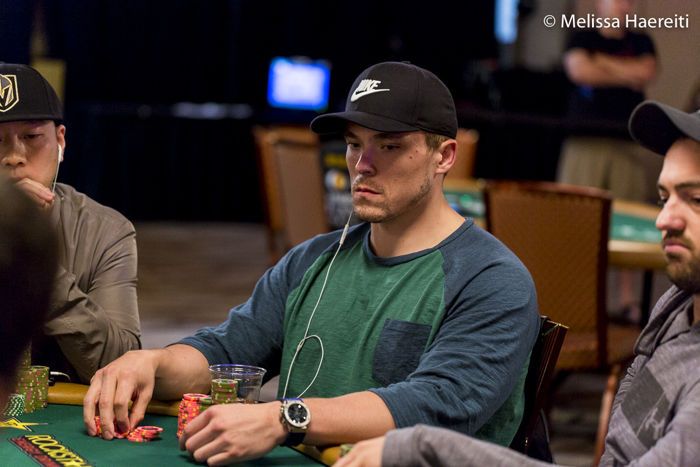ICM considerations can make for strange bedfellows.
In poker, taking it easy on someone, otherwise known as soft play, is considered collusion. Obviously, collusion is against the rules. However, short-handed at the final table of a tournament, there may be several situations where it simply makes sense to play a little softer against an opponent than one normally would.
Alex Foxen Wins WPT Five Diamond World Poker Classic 1,035-entry field largest-ever for a $10,000 buy-in World Poker Tour event First WPT title earned Foxen $1.7 million, $15,000 seat into the Tournament of Champions Foxen now leads Global Poker Index Player of the Year race after winning in 2018. 3,364 Followers, 296 Following, 14 Posts - See Instagram photos and videos from Alex Foxen (@waf2191).
Imagine you were three-handed in the $5,000 buy-in Mid-States Poker Tour Venetian Main Event this past weekend. Finish third and you’ll earn $120,000. However, there’s a big pay jump up to second, where you’ll earn $169,000. Plus, an even bigger one if you can win and collect the $270,000 first-place prize.
Now imagine you have 45 percent of the chips in play, one opponent has 45 percent as well, and the other player holds just 10 percent. It just makes sense to avoid confrontation with the player holding an equally big stack. You’re naturally going to focus on getting rid of the short stack first. That means playing a little softer against that equally stacked player, and by definition, you would be guilty of collusion.
Collusion or standard practice?
However, it’s the kind of collusion that seems to be standard practice in poker. Perhaps because it’s just common sense, this kind of collusion has even been deemed acceptable.
Now imagine that player is a good friend. Perhaps you have a backing arrangement, or maybe you’re in a relationship together.
Real-life couple Alex Foxen and partypoker pro Kristen Bicknell, who have been killing it everywhere from Las Vegas to Macau lately, don’t have to imagine this scenario. They just went through it in that MSPT Venetian Main Event.
Aussie standout Kahle Burns was in the unfortunate position of third wheel as they battled it out on a Twitch live stream for some pretty hefty sums of cash.
Colluding on camera?
Alex Foxen Football
With the cameras watching at all times, Foxen and Bicknell appeared to say and do very little that would indicate any kind of collusion, outside of normally acceptable practices. However, they are indeed a couple, making increased accusations of soft play almost inevitable.
Three-handed play lasted close to four hours. Burns was finally sent packing and Foxen and Bicknell chopped, playing a couple hands for the title and an additional 10 percent of the remaining prize money they were forced to set aside and play for.
But not before one big hand played out three-handed, filling the Twitch chat with numerous accusations of collusion.
Burns was relatively short, holding about 750,000 in chips at the time. Foxen and Bicknell looked to be about even in chips, on about 2.2 million each.
Foxen raised the button with two jacks. After Burns folded the small blind, Bicknell saw two aces in the big blind and three-bet. Foxen called and hit top set on the flop. Bicknell bet 200,000 and Foxen just called before a king came on the turn.

Bicknell checked, then snap-called when Foxen bet 375,000. She also checked a brick on the river quite quickly and Foxen took a minute before sliding out a bet of 600,000. Bicknell took her time about it, but eventually opted to fold. Foxen showed the set, and Bicknell confirmed she had aces when a clearly disappointed Burns asked.
Acceptable collusion?
Two players not involved in a relationship would have been all in there, according to several commentators in the Twitch chat. Most pointed to the hand as a clear indication of the couple’s collusion.
Perhaps they were, but isn’t this a clear example of the same kind of acceptable collusion any two players would be guilty of in a three-handed scenario with similar stack sizes?
Bicknell said as much to MSPT staff after the tournament ended:
“Kahle was really short. Regardless of who it was, two chip leaders don’t want to get in a big battle when there’s a short stack.”
Foxen made specific reference to the ICM implications and steep payouts. Something he said would normally be an incentive to chop. Burns twice declined to chop during three-handed play.

Both Bicknell and Foxen said part of the reason the hand played out the way it did is an intimate knowledge of each other’s thought process. Unlucky for Burns, but certainly not an indication of anything untoward.
Of course, that didn’t stop some members of the poker community from taking to Twitter to voice their concerns.
Alex Foxen
Burns’ friend, fellow Aussie and World Series of Poker bracelet winner James Obst, said he was aggravated seeing his friend forced to play against a team three-handed. He went on to say the couple’s behavior was not blatant, but also not representative of two people trying to beat each other:

Haven't had a shred of negative energy this summer, but watching Kahle Burns get screwed by a team 3handed has gotten me seriously aggravated ????
— James Obst (@JamesObst) June 18, 2018
Intrinsic collusion in three-handed play
Obst’ accusations don’t change the fact this came down to what amounts to a very common situation once three players are left in a tournament.
The two big stacks made the careful and considered decision not to play for stacks in a big hand. By definition, it’s collusion. But it’s the kind of collusion that appears to be acceptable, and at the very least, unavoidable. It likely would have happened whether they are a couple or not.
Bicknell made the mistake of whispering something in Foxen’s ear soon after the hand. She needs to learn this kind of behavior only helps fuel the fire of those who would suggest the couple are guilty of something and never do it again. They appeared to show each other a good number of hands as well. Something two players who should have been aware of the scrutiny they’d be under might want to avoid next time.
However, that’s all just optics. It changes nothing about intrinsic collusion in three-handed play. Nor does it make poker’s newest power couple guilty of anything more than that.
Image courtesy of MSPT/Twitter